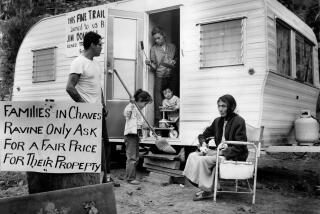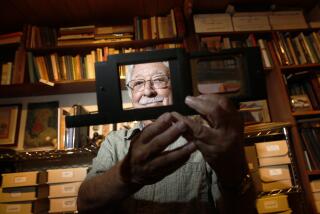Campo de Cahuenga Must Not Fall to Commuter Convenience
- Share via
I have always felt fondly toward John C. Fremont. If you like heroes in your history, nobody looked better in a uniform than John. And if you draw comfort from knowing your ancestors were as neurotic as your relatives are, John could have been a case study in dysfunction. He was a romantic; bold, vain, endearing and foolish, all at once.
During the Mexican-American war, John was in charge of a rowdy bunch that wanted to “free” California. Most of the people would probably have joined the United States without all the shooting and shouting but that was inconvenient; these boys wanted a war and the U.S. Army thoughtfully supplied them with one.
You see, Los Angeles had surrendered peacefully but the occupation force had acted like such jerks that the population rose up under the leadership of Andres Pico and threw them out.
The Army came back, squeezing Pico’s troops against Fremont’s boys who were coming down from Santa Barbara. Everything was in place for a massacre when Fremont did something outrageous. In a little adobe he signed the Treaty of Cahuenga, ending the war one battle short.
There were lots of romantic reasons to sign the treaty. It was written by a woman, and John was always gallant around women. There was glory in having his name remembered for ending the war. And there was also an obligation to the future, to you and me. Being a romantic, John knew that tombstones have long memories. If there had been a last battle, he knew the dead, the wounded and the prisoners would have weighed heavily on the new American city of Los Angeles.
*
One hundred and fifty-two years later that very city is now determined to destroy the tiny park memorializing the treaty: Campo de Cahuenga. The Los Angeles Department of Transportation wants to widen Lankershim Boulevard by 27 feet, almost up to the little park’s flagpole. The department wants to add more turn lanes and they don’t want to take the land away from the corporation across the street. It’s a pragmatic choice, based on traffic flow and politics and convenience, the here and the now. And it is a choice that would have made John Fremont angry.
John could not have foreseen autos or subways or movie studios. But he understood ungratefulness because that is a human failing and it is humanity that binds the past to the future.
John Fremont gave a gift to this city, a treaty instead of a battle. He gave us a tiny spark of romance, a patch of green squeezed between tall pragmatic buildings and practical concrete. To destroy in any part or parcel that gift is to insult a man who felt more fondly toward us than we do toward ourselves or toward our future.
More to Read
Sign up for Essential California
The most important California stories and recommendations in your inbox every morning.
You may occasionally receive promotional content from the Los Angeles Times.













